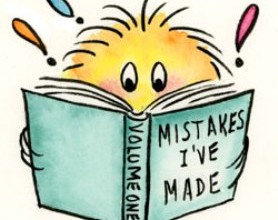One of the side-effects of the bad economy is that we get a lot of resumes. I'd say at least 2-3 inquiries per week come in through the website, with an occasional hard-copy. It's tough out there - many of the eager job seekers would have no problem finding work prior to the Great Recession. I try my best to answer every request, even if it's only to say, "sorry, we're not currently hiring for this position."
Amidst the slew of emails and unsolicited resumes, I've noticed several trends from recent college grads. It's apparent that schools are doing a poor job at actually training their students in obtaining gainful employment. So, rather than letting these -hopeful-job-seekers flounder, I've assembled a set of quick tips on how to apply for a job at a creative firm, design shop, or marketing consultancy:
Shawn's Top 5 Things NOT to Say if You Want a Job:
 "I'm a recent graduate of XYZ University." This one drives me crazy - I can't tell you how many students lead with this in their introduction because frankly, I don't care. You could have gone to Eastern Montana Community College for all I know...what's important isn't WHERE you went to school, but that you actually LEARNED something while you are there. If you're applying for a creative position, this is perhaps the least creative way to introduce yourself.
"I'm a recent graduate of XYZ University." This one drives me crazy - I can't tell you how many students lead with this in their introduction because frankly, I don't care. You could have gone to Eastern Montana Community College for all I know...what's important isn't WHERE you went to school, but that you actually LEARNED something while you are there. If you're applying for a creative position, this is perhaps the least creative way to introduce yourself.- "To Whom it May Concern:" Snooze. I know this was the standard for years, but we're not talking about applying for a job at IBM. Most small firms don't have an HR department, and determining the decision-maker is quite feasible. If at all possible, find out who should get your inquiry and address the letter to them.
- "Hello, I'm very excited to work for your company," (or, even worse, to put the name of a different company in the letter hastily copied and pasted from the last application). Applying for a job is often a numbers game - the more applications you get out there, the better. That said, if you really want a job, write a letter than matches your level of enthusiasm. Employers want to see something that speaks to why you want to work at their firm and not anywhere else.
- "Hi, my name is Suzy Smith and I'm looking to explore new career options." This has to be one of my all-time favorites...the applicant is more-or-less letting me know that they might work out as an employee. While I definitely appreciate the concept of changing careers, I highly doubt any employer will be willing to foot the bill for this endeavor.
- "I'm moving to Portland and wondering if you have a job." This one is hard on several levels. First, the grammar is pretty bad. Second, the hopeful employee is moving to perhaps the worst city in the country for creative professionals - not because Portland isn't a creative mecca (it is) but because there's simply an oversupply of talent. It's hard enough getting a job in a state with 10% unemployment, but doing so without any professional connections is really, really difficult. If you're from another state and reading this post, here's my message: start looking before you move. Even better, try to build professional relationships early and often. Resources like LinkedIn, local websites, and even (I hate to say it) Facebook make this more feasible than ever before.
Ok, so now that you know what NOT to do, here's how to improve your odds:
 Network, network, network. Most unsolicited emails go in the trash, and any open positions will have a line out the door. Your best chances at gainful employment will come from having insider information. The more people you know, the better your chances. If you don't know anybody, start participating in professional organizations like the AIGA and the AMA. Think about volunteering for a non-profit - it's a great way to meet more well-connected people.
Network, network, network. Most unsolicited emails go in the trash, and any open positions will have a line out the door. Your best chances at gainful employment will come from having insider information. The more people you know, the better your chances. If you don't know anybody, start participating in professional organizations like the AIGA and the AMA. Think about volunteering for a non-profit - it's a great way to meet more well-connected people.- Follow the Rules. Most hiring is a matter of mass-screening. If you are asked for a cover letter and resume, don't skip the cover letter. If it asks to address the letter to a specific person, do it. We're in the process of creating a career portal on the Kinesis website and I will tell you right now that a primary function will be to screen and eliminate unqualified applicants. If they can't follow directions when applying for the position, they certainly won't follow directions later on down the road.
- Build a website. For design professionals this is a no-brainer, but you'd be surprised how many resumes don't include a link to a personal website.
- Be creative (but to the point). One of my favorite cover letters began like this: "I know you're busy, so I'll be brief." She then went on to explain how interested she was working for Kinesis, and how she could bring a lot of value to the firm...which leads me to the final point...
- Ask, "What's in it for you?" Most job applicants start with the perspective as to why THEY want to work for Kinesis. Wrong. Start from the perspective of the employer. Ask yourself how you can contribute to the business and help propel the organization forward. All business owners want one thing out of employees - added success for the business. If you can succinctly explain why hiring you will contribute significantly to their business efforts, you'll leap ahead of 90% of the competition.
Getting a job right now is harder than ever - especially for new graduates and those with little real-world experience. While we see signs of improvement in the economy, the slow recovery will mean a tough job market for at least another year or two. By following just a few of these tips, you can improve your odds significantly.

 "I'm a recent graduate of XYZ University." This one drives me crazy - I can't tell you how many students lead with this in their introduction because frankly, I don't care. You could have gone to Eastern Montana Community College for all I know...what's important isn't WHERE you went to school, but that you actually LEARNED something while you are there. If you're applying for a creative position, this is perhaps the least creative way to introduce yourself.
"I'm a recent graduate of XYZ University." This one drives me crazy - I can't tell you how many students lead with this in their introduction because frankly, I don't care. You could have gone to Eastern Montana Community College for all I know...what's important isn't WHERE you went to school, but that you actually LEARNED something while you are there. If you're applying for a creative position, this is perhaps the least creative way to introduce yourself. Network, network, network. Most unsolicited emails go in the trash, and any open positions will have a line out the door. Your best chances at gainful employment will come from having insider information. The more people you know, the better your chances. If you don't know anybody, start participating in professional organizations like the AIGA and the AMA. Think about volunteering for a non-profit - it's a great way to meet more well-connected people.
Network, network, network. Most unsolicited emails go in the trash, and any open positions will have a line out the door. Your best chances at gainful employment will come from having insider information. The more people you know, the better your chances. If you don't know anybody, start participating in professional organizations like the AIGA and the AMA. Think about volunteering for a non-profit - it's a great way to meet more well-connected people.